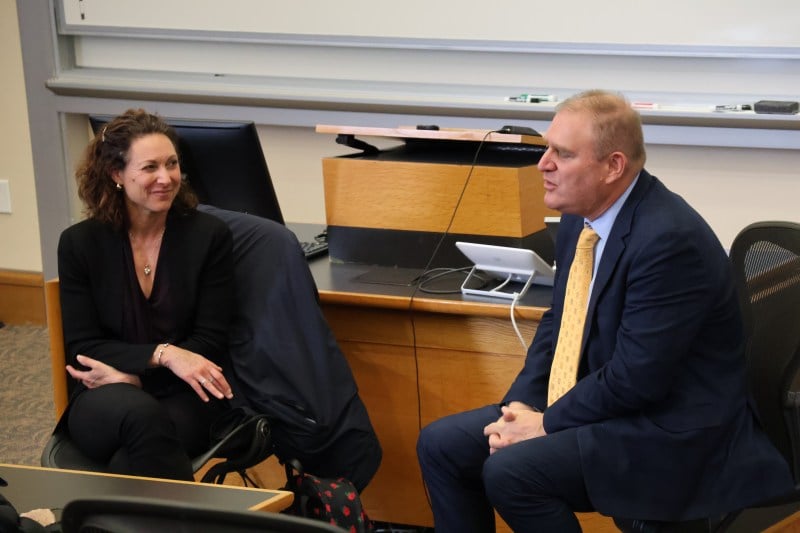Major media outlets are at risk of losing audiences over 2024 presidential election coverage, said Emily Bazelon, a staff writer for The New York Times Magazine, during a Jan. 18 event hosted by the Legal Journalism Initiative at the Stanford Law School (SLS).
“Trump has been, obviously, a destructive force, but also a distorting force, for the media,” Bazelon said regarding former President Donald Trump’s current candidacy. “He makes us [the media] into his opponents, and that’s a really uncomfortable position for us to be in.”
About a dozen people attended the event, moderated by James B. McClatchy Professor of Law Nathaniel Persily. The conversation centered around lawsuits shaping the 2024 election and regulation against election misinformation on social media.
Bazelon said she worries that Trump supporters are turning against the press. Meanwhile, outlets that balance perspectives from both sides of election controversies may alienate liberal audiences, she said.
“The media is a mostly liberal place at institutions like the Times, and we do have our blindspots,” Bazelon said. “We have a lack of representation of conservative voices in the newsroom, and that is a real challenge.”
According to Persily, major media outlets are also challenged in covering the “unprecedented legal gymnastics” taking place in the courts. The Supreme Court will decide on Feb. 8 whether Trump’s involvement in the Jan. 6 insurrection disqualifies him from the Republican primary ballot in Colorado.
“When things get sexy — to those of us in law school — is when they go to court,” Persily said, sparking laughter from the audience.
Persily and Bazelon also reflected on news outlets’ potential amplification of election controversies.
“The Pizzagate incident did not get national attention until it was covered by The New York Times,” Persily said, referring to a disinformation incident before the 2016 presidential election. Democratic candidate Hillary Clinton was falsely accused of operating a child abuse ring with her campaign chief, John D. Podesta, in a pizza restaurant’s back rooms.
For the upcoming election, the Times chose to separate its coverage of democracy and politics into separate beats, Bazelon said. Reporters from each beat cover different sets of topics, but sometimes the two areas overlap. The democracy beat, which became popular over the past four years, centers around issues like voter suppression and other election threats.
“The press is trying to stand up for democracy by talking about laws, principles and a set of neutral norms,” Bazelon said, pointing to Times coverage of Trump’s refusal to accept the 2020 election results. “It’s really hard when the Republican Party is lined up behind someone who is ready to throw all that up in the air.”
An audience member asked about another controversial coverage area: media outlets’ reporting on campus discourse at elite universities in the wake of the Israel-Gaza war.
Bazelon said she had resisted writing about this issue for months. Media coverage amplifies the most extreme voices on campus, but those voices are not representative of the student body, she said.
“By amplifying it, the media gives it more life,” Bazelon said.
Ben Wofford, third-year law student and student co-director of the Legal Journalism Initiative, wrote that he considered it a “rare treat” to hear Bazelon share her perspective and insights on the inner workings of the Times. It was also a “cause for serious reflection and pause,” Wofford wrote to The Daily.
The Legal Journalism Initiative, currently led by Wofford and second-year law student Molly Shapiro, was created as a “forum that would marry journalistic storytelling and the law.” Larry Kramer Professor of Law Michelle Anderson serves as the faculty advisor.
Since its creation, the initiative has held small seminars that discussed magazine stories chosen by guest journalists. Past guests include Michael Schaffer and Elizabeth Ralph, editors of POLITICO Magazine, and Andy Kroll, a reporter for ProPublica.
“The engine of the law is often stories about individual people, yet law students often express frustration about unearthing and centering those stories,” Wofford wrote.
Wofford said his personal experience inspired his involvement in the initiative. He previously wrote for POLITICO Magazine, Rolling Stone and Washingtonian before coming to SLS.
As court cases make news headlines, Wofford hopes the initiative can be an avenue for law students to learn “how to make journalistic writing a part of their advocacy and law careers,” while introducing legal scholars to journalists.
Bazelon said Times journalists strive to be “independent” in their coverage of the upcoming elections.
“Being independent means being open-minded and following the facts or reporting whatever they may be,” Bazelon said, citing New York Times publisher A. G. Sulzberger. “Even if they take you away from your prior convictions.”
